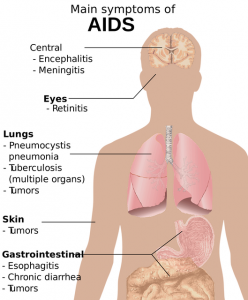HIV (human immunodeficiency virus) is still very much a public health concern. Deficiencies of certain micronutrients are known to play a role in the progression of HIV infections to AIDS (acquired immunodeficiency syndrome). In particular, adequate intakes of selenium are important because of selenium’s antioxidant and anti-inflammatory activities in HIV infection [Pourmoradian 2023].
Umbrella Study of Systematic Reviews of Selenium and HIV Studies

In a 2023 umbrella study of systematic reviews of studies of selenium in HIV patients, Pourmoradian et al found the following evidence:
- Four reviews showed that selenium supplementation at the level of 200 mcg/day was effective in delaying CD4 decline in HIV-infected patients.
- Three reviews showed that selenium supplementation at the level of 200 mcg/day significantly reduced HIV viral load.
- The researchers suggested that the underlying mechanism of the selenium effect on HIV progression is the improvement of the immune response and the antioxidant defense system.
- In particular, the selenium-dependent glutathione peroxidase (GSH-Px) enzyme system reduces the extent of oxidative stress, indirectly strengthens the immune system, and slows the progression of the disease.
Note: CD4 cells are lymphocytes that help to coordinate the immune response to infections. If an HIV patient’s CD4 cell count falls below 200 cells per cubic millimeter of blood, then the HIV infection is considered to have progressed to the AIDS stage. In healthy individuals, the CD4 count will be between 500 and 1,600 cells/cubic millimeter of blood.
Note: The term HIV viral load refers to the number of HIV virus copies in a milliliter of blood. The goal of HIV treatment is to reduce the number of HIV copies in a milliliter of blood to the point where the HIV is no longer detectable in the blood.
Selenium Supplementation Delays CD4 Decline in HIV-infected Patients
A 2019 systematic review of six randomized clinical trials compared selenium supplementation with placebo [Muzembo 2019].
- Daily supplementation with 200 mcg selenium slowed the rate of decline in CD4 cell count and thus slowed the progression of the infection to the AIDS stage.
- The researchers observed the beneficial effect of the selenium supplementation on CD4 cell count in patients not yet receiving antiretroviral therapy and in patients receiving antiviral treatment or highly active antiviral treatment.
- The length of selenium supplementation ranged from 9 to 24 months.
- The selenium supplements were well tolerated in all reviewed studies.
Conclusion: Selenium Delays the Progression of HIV Infections
We have clinical evidence that selenium supplementation delays CD4 cell count decline in HIV-infected patients.
As a consequence, the progression of HIV infection to the AIDS stage slows down.
There is a need for more evidence on the question of whether selenium supplementation can reduce or suppress HIV viral load.
Sources
Muzembo BA, Ngatu NR, Januka K, Huang HL, Nattadech C, Suzuki T, Wada K, Ikeda S. Selenium supplementation in HIV-infected individuals: A systematic review of randomized controlled trials. Clin Nutr ESPEN. 2019 Dec;34:1-7. doi: 10.1016/j.clnesp.2019.09.005. Epub 2019 Oct 3.
Pourmoradian S, Rezazadeh L, Tutunchi H, Ostadrahimi A. Selenium and zinc supplementation in HIV-infected patients. Int J Vitam Nutr Res. 2023 Feb 2. doi: 10.1024/0300-9831/a000778. Epub ahead of print.
The information presented in this review article is not intended as medical advice and should not be used as such.
15 May 2023
